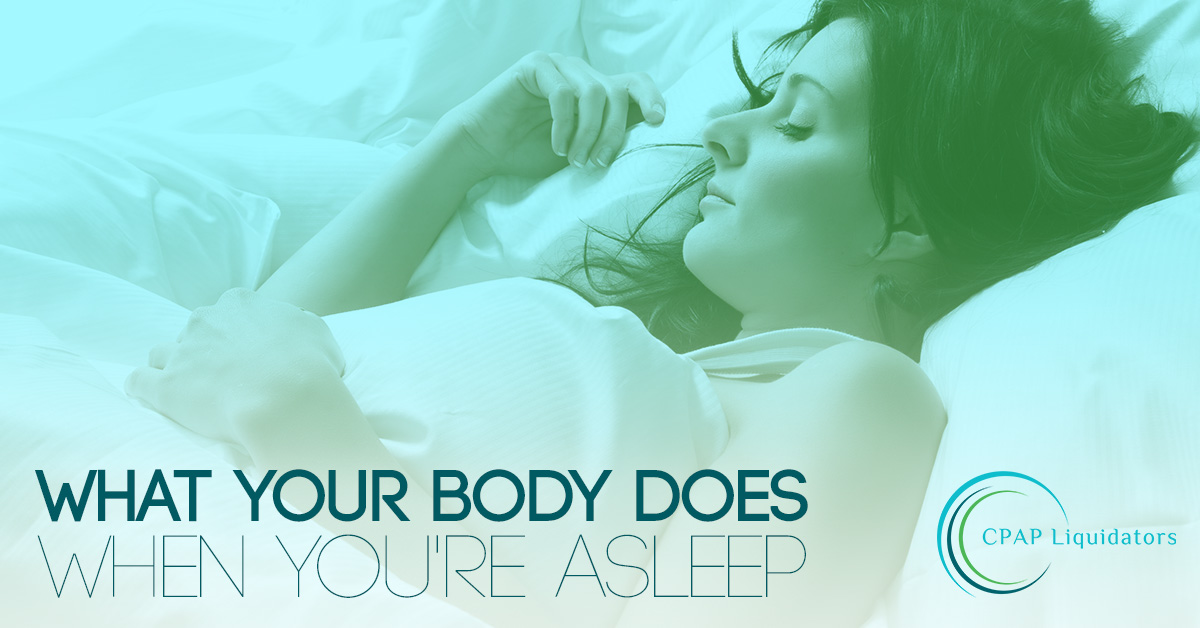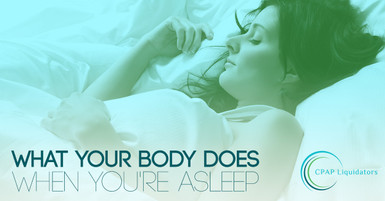Jul 14th 2017
What Your Body Does When You're Asleep

What happens to your body when you sleep?
For those who have sleep apnea, a good night’s sleep can be difficult to come by, especially without the right treatment. However, some people put off getting the treatment that they need because they don’t realize how crucial getting enough sleep is for their health and wellness. Your body isn’t resting on its laurels while you are sleeping; it’s hard at work. In order to understand the true importance of a good night’s sleep, you need to understand what your body is up to while you’re asleep. Here are a few things that happen in your body when you’re fast asleep:
#1. There is a drop in your core body temperature.
In the few minutes before you fall asleep, your core body temperature will start to fall. This drop in temperature prompts the release of melatonin, which is a hormone that regulates your circadian rhythm — otherwise called sleep/wake cycle — and lets your body know that it’s time to go to sleep. A common theory as to why this happens among scientists is so the body can preserve energy normally used for to maintain its temperature. When your body’s temperature is lower, you burn fewer calories. Something similar happens when bears hibernate, except the drop in temperature is much more drastic and slows their metabolism down to only 25 percent of the typical rate. According to Dr Avi Ishaaya, a sleep specialist from UCLA, sleep is actually a survival mechanism, and lowering the core temperature is a key part of that.

#2. Your brain is organizing and cleaning house.
Did you know that neurons in your brain fire almost as much when you’re asleep as they do when you’re awake? It’s patently false to claim that your brain is at rest when you’re asleep. In fact, it’s actually quite busy. During sleep, your brain is creating and consolidating memories, making creative connections, getting rid of toxic molecules that can accelerate degenerative disease, such as Alzheimer’s or Parkinson’s, as well as learning and remembering how to perform tasks. One fairly common theory is that dreams occur because of the brain’s process of filtering out unnecessary information and storing the information gained during the day.
#3. Your heart rate and blood pressure decreases.
During sleep, your heart doesn’t have to pump as much blood, because your body doesn’t require quite as much oxygen or nutrients when it’s at rest. This also leads to a drop in blood pressure, and gives your heart, as well as your circulatory system, the chance to repair itself. People who suffer from sleep apnea often suffer from high blood pressure, and part of the reason for this is that those systems do not have a chance to rest or repair during sleep.
There are many things happening your body while you’re sleeping. If sleep apnea is preventing you from getting the sleep you need, and you’re looking to save more on the equipment you need to treat it, shop our used CPAP and BIPAP machines today. To learn more about what happens to your body when you’re sleeping, please stay tuned for our next blog.


